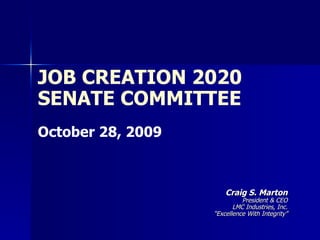Job Creation 2020 Senate Committee Presentation 10 28 09 Linked In
- 1. JOB CREATION 2020 SENATE COMMITTEE October 28, 2009 Craig S. Marton President & CEO LMC Industries, Inc. “ Excellence With Integrity”
- 2. JOB CREATION ~ Discussion Topics What will the Missouri workforce look like in 2020? What employee skills and knowledge will be needed to grow the state’s economy? What will our industries/businesses look like in 2020? Where are our future opportunities for (job) growth? What are the challenges? What role should government play in job creation? How can we maximize job creation through public-private partnership? How do we balance public and private interests? What “best practices” or models in other states can we learn from?
- 3. 1) What will the Missouri workforce look like in 2020? First; let’s survive 2010, 2011, 2012 … With a majority of “baby-boomers” retiring by 2020, the workforce will be young and diversified. If manufacturers are wealth constrained; jobs will continue to move off-shore leaving only service related and low paying jobs, i.e., retail, etc. If manufacturers are wealth creators; the workforce will fill productive and higher paying manufacturing jobs, i.e., engineering, quality, design, technical, research & development, value-add production, etc. There is no 2020, without 2010, 2011, 2012 …
- 4. With service related jobs, skill and knowledge requirements will be minimal, i.e., middle school basic math, language, etc. With manufacturing jobs, we will need skills to compete globally with low-cost and high-tech countries, i.e., engineering, quality, design, problem-solving, research & development, etc. 2) What employee skills and knowledge will be needed to grow the state’s economy? The choice … Service OR value-added jobs?
- 5. If manufacturers are wealth constrained; Missouri and the US will be a service provider, living off credit from other nations, i.e., China. If manufacturers are wealth (and job) creators; Missouri and the US can regain it’s financial superiority in the world economy. 3) What will our industries/businesses look like in 2020? The key … ADD VALUE.
- 6. Jobs come from “wealth”. Wealth comes from; The ground in the form of crops, or the use of resources such as oil, natural gas, coal, etc. Manufacturing ~ Converting raw materials to end products for sale both inside and outside Missouri and the US. As wealth (real money) grows, so does demand, and in turn, JOBS. Money will flow to the US creating wealth for government and business. When we aren’t “producers”, our money is spent outside the US weakening our economy, forcing us to live off credit from other countries, i.e., China. 4) Where are our future opportunities for (job) growth? How can we create wealth (& jobs)?
- 7. Surviving the recession. Convincing financial institutions (or SBA, or DED) to provide loans or lines-of-credit to small businesses. Assuring earnings remain with businesses for re-investment ~ minimize regulation and taxation. Competing and growing market-share in a low-cost, high-tech global environment. Localizing manufactured and consumed products. Innovation; in the form of new products, and creative improvements to existing products. Identifying strong leadership with a long-term strategy. 5) What are the challenges? Survival.
- 8. “ Stimulate” financial institutions (or SBA, or DED) to support local business with loans and credit lines. Support businesses that grow jobs by creating and maintaining a fair balance between regulations and freedom to compete globally, i.e., Taxes, Cap & Trade, etc. Provide immediate cash incentives for businesses to retain jobs; then, long-term rewards for creating jobs. Demand and protect a globally level playing-field. Expand “Enterprise Zones”. 6) What role should government play in job creation? Help businesses succeed.
- 9. When government provides financial assistance for companies with job growth capabilities, the return-on-investment is less than 24-months, and comes from: State & local business income tax revenues State & local individual income tax revenues Real and property tax revenues Reduced unemployment and welfare costs Ripple effect through community ~ producing sales tax revenues, jobs, etc. Stop card-check; it will reduce the our ability to compete with low-cost countries and kill jobs. 6) What role should government play in job creation? (continued) Help businesses succeed.
- 10. The Government is pouring a lot of money into the future ~ but TODAY is more important. Stimulus funds have assisted small “start-up’s” and large distressed businesses. Nothing is available for existing small and mid-sized manufacturers. Provide training funds (cash, not credits), making our workforce globally competitive. 7) How can we maximize job creation through public and private partnership? Provide solutions; not bureaucracy.
- 11. Retain jobs, then grow jobs ~ it doesn’t work in reverse. Eliminate or reduce costs which are not essential and/or do not add-value to manufacturing. Remember, wealth creates jobs. Provide training funds (cash, not credits), making our workforce globally competitive. Re-charter Technical High Schools ~ 25 years ago they provided excellent basic training for industry. 8) How do we balance public and private interests? Survive … then grow.
- 12. A real-time example: Our company (LMC Industries) recently hired 2 people from Minnesota. In exchange, Minnesota is sending us training funds; cash, not credits .  Missouri’s requirements are too restrictive and/or just provide credits. Additionally, many jobs don’t qualify for Missouri assistance. If Missouri and the US would provide real-time assistance to retain jobs, job creation will follow. 9) What “best practices” or models in other states can we learn from? Immediate incentives … not future credits.












